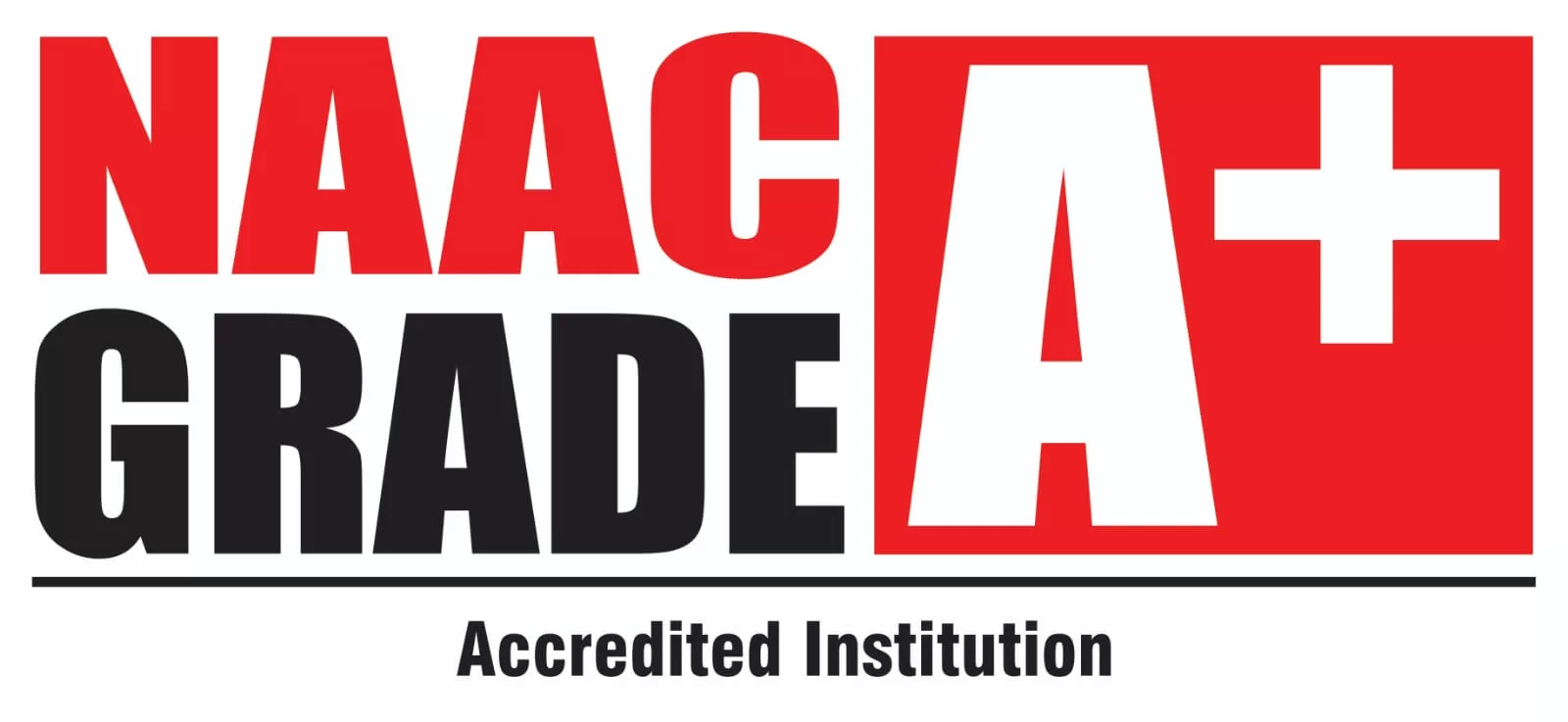

Labs
Surveying Lab

Surveying is the art of determining relative positions of objects on the surface of earth by taking measurements in the horizontal & vertical plane. The main objective of surveying is to obtain a map or a plan of area surveyed . The success of any engineering project is based upon the accurate & complete survey work. The survey lab is fully equipped with all the major & modern equipments used for modern surveying techniques. The major instruments like Total Station, auto level, dumpy level, theodolite, prismatic compass, plane table, tangent clinometers, ghat tracer, telescopic alidade, survey scales etc. are used by the students for both plane & geodetic surveying. Surveying in the modern era is relevant to aerial as well as marine boundaries.
Geotechnical Engineering Lab
In geotechnical engineering lab experiments related to soil investigation to determine the various index or engineering properties of soil are performed. Following are the parameters/apparatus to be used in this lab:
California Bearing Ratio, Consolidation, Constant Volume, Moulds, Cyclic-cum-Static Triaxial Testing Machine, Digital Triaxial Shear Test Apparatus, Direct Shear Apparatus, Dynamic Tests Equipment for Pushing & With Drawal of Vane Borer Extraction & Sample Preparation, Field Density, Specific Gravity & Relative Density, Grain Size Analysis, High Sensitivity Proving Rings, Insitu Vane Shear Test, Liquid Limit Measuring Device, Ovens ,Penetration Test, Shrinkage Limit Test, Sieve Shakers ,Site Investigation and Sampling, Soil Samplers, Soil Penetrometers, Soil Permeability, Standard Test Sieves ,Static Cone Penetration Test ,Strength Measurement, Triaxial Cells ,Triaxial Setup, Water Content and Dry Density of Soils.
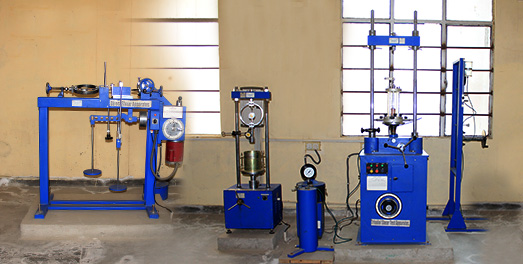
Physics Lab
Our state-of-the-art Engineering Physics Lab is equipped with advanced instruments and equipment to support a wide range of experiments and research activities. Some of the key facilities include:
Optics Laboratory: Explore the behavior of light and its applications in engineering, from optics experiments to laser technology.
Mechanics and Motion Lab: Study the fundamental principles of mechanics, including kinematics, dynamics, and the behavior of materials under various forces.
Electronics and Circuits Lab: Learn the basics of electronics, from circuit design and analysis to practical applications in engineering projects.

Structural Analysis Lab
It consists of the apparatus like Unsymmetrical Bending Apparatus, Portal Frame Apparatus, Pin Connected Truss, Three Hinged Arch, Two Hinged Arch, Elastically Coupled Beam Apparatus, Redundant Joint Apparatus Columns and Struts Apparatus, Clark Maxwell’s Reciprocal Theorem Apparatus, Deflection of Curved Beam Apparatus, Stiff Jointed Truss.
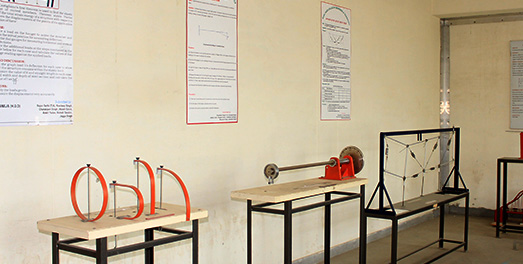
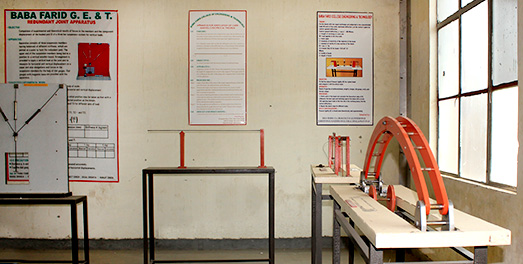
Solid Mechanics Lab
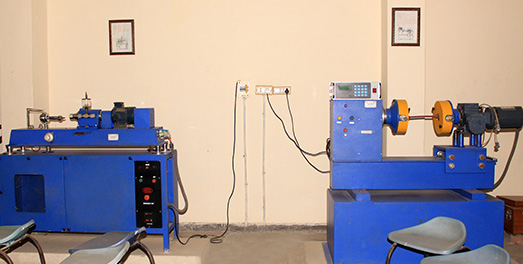
In day to day work, an engineer comes across certain materials i.e. steel girder, angle iron, circular bars, cements etc. which are used in various civil engineering projects. While selecting a suitable material, for the project, an engineer is always interested to know its strength. The strength of material may be defined as ability, to resist its failure and behavior under the action of applied forces. It has been observed that, under the action of the forces, the material is first deformed and then its failure takes place. A detailed study of forces and their effects, along with some suitable protective measures for safe working condition is known as strength of materials. In a matter of fact, such a knowledge in very essential, for an engineer, to enable him, in designing his all types of structures and machines. The major equipments in this lab are universal testing machine(U.T.M), Torsional testing machine, Fatique testing machine, spring testing machine, Impact testing machine and hardness testing machine from which the students can take practical knowledge to check any type of metals , springs plates, sheets ,steel or any other type of material.
Fluid Mechanics Lab
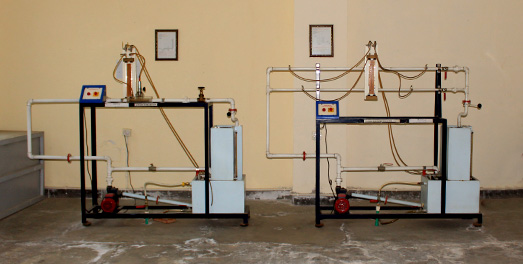
Fluids are a key element of study for many engineering disciplines. Fluid Mechanics incorporates the study of all types of fluids under static, kinematic & dynamic conditions. The fluid Mechanics laboratory objective is to provide engineering practical training through verification of scientific theorems, related to fluid in general & water in particular that support the theoretical parts of related course .This Laboratory offers equipments for experimenting with and analyzing water behaviors . The lab is well equipped with different flow losses measuring set up’s so as to effectively understand the principle of losses in pipe due to friction and also the losses due to sudden enlargement and contraction of pipes. Flow measuring equipments such as venturimeter, orifice meter, pitot tube etc, are also providing the valuable practical knowledge of the subject to the CE students. The lab is also equipped with the latest Reynold’s apparatus, Bernoulli’s apparatus, meta- centric height apparatus, flow through orifice and mouthpiece & the discharge over notches apparatus, where the students can visualize the basic theory of working of flow meter & can enhance their theoretical knowledge through practical.
Environmental Engineering Lab
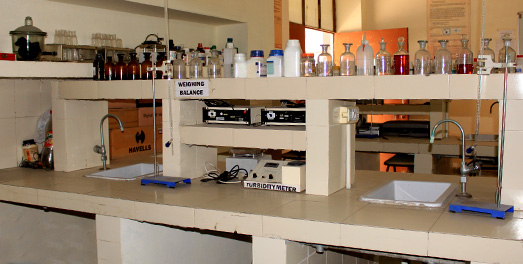
In environmental engineering lab, various experiments/tests are conducted on the samples of raw water or waste water collected from various sources for determination of the parameters of quality concern such as suspended solids, bio degradable organics, pathogens, indicators, nutrients, priority compounds, refractory, recalcitrant compounds, dissolved organics and heavy metals. Impurities in water, sampling of water, physical, chemical and bacteriological quality for Domestic water supply, etc. are the works usually stressed upon in this lab. Following are the tests performed in this lab.
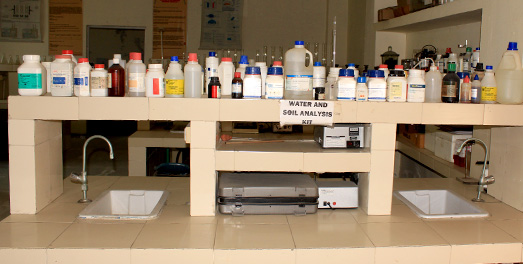
Computer Aided Design Lab
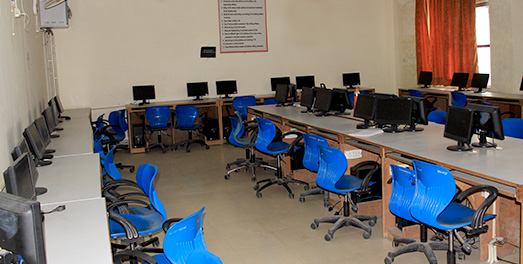
In CAD lab, the students are required to become familiar to the use of computer software for drawing structural as well as architectural details related to various projects of Civil Engineering. Following is the subject matter to be followed in this lab:
Detailed Working Drawings (Computer Aided):
- Isolated Footing: Rectangular, Circular and Square footing.
- Combined Footing : Rectangular, Trapezoidal, Strap and Raft Footing
- Spherical and Conical Domes
- Cantilever and Counter fort Retaining Walls
- Intz Tank
Transportation Engineering Lab
In transportation engineering lab, the experiments / tests are perfomed on the samples or specimens of Sub-grade Soil, Aggregates and Bituminous Materials to ensure their quality. Following are the various equipments / apparatus to be used for the above said purpose.
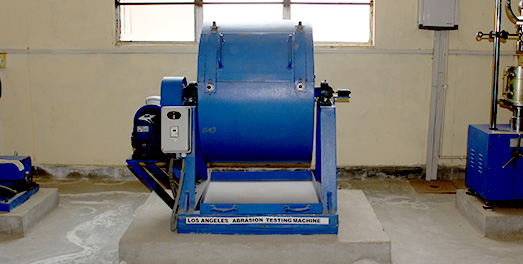
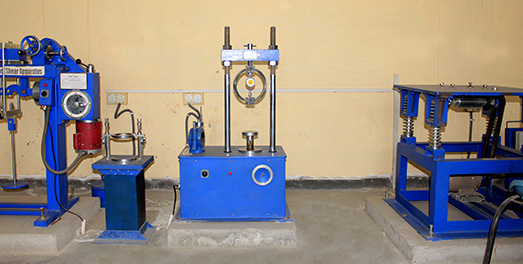
Concrete Technology Lab
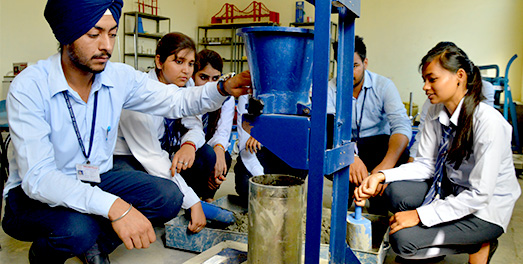
This lab is proposed for preparing the students to apply their skills in the field/site or in the office concerned with Plain Cement Concrete or Reinforced concrete Specific Gravity of cement, Standard Consistency, Initial and Final Setting Times of Cement, Soundness of Cement, Compressive Strength of Cement, Compressive Strength of Bricks/Tiles, Fineness Modulus of Fine and Coarse Aggregates, Bulk Density, Water Absorption and Sp. Gr. of Fine and Coarse Aggregates, Slump, Compaction Factor and Vee-Bee Time of Concrete, Mix Design of Concrete, Compressive Strength of Concrete by Cube and Cylinder, Tensile and Flexural tests of Concrete, Compressive Strength of hardened Concrete by Non-Destructive Test.
Aggregate Testing, Air Entrainment Meter, Auto ranging, Compression Testing Machine, Consistency & Workability of Concrete, Fineness of Flexure Testing Hydraulic Manhole Cover Testing Machine Moulding Permeability Sampling of Cement Servo Controlled Compression Testing Sieve Soundness Standard Test Sieves Strain Measurement & Allied Tensile & Flexural Strength Universal Testing Machine Universal Testing Machine with Auto Pacer.


